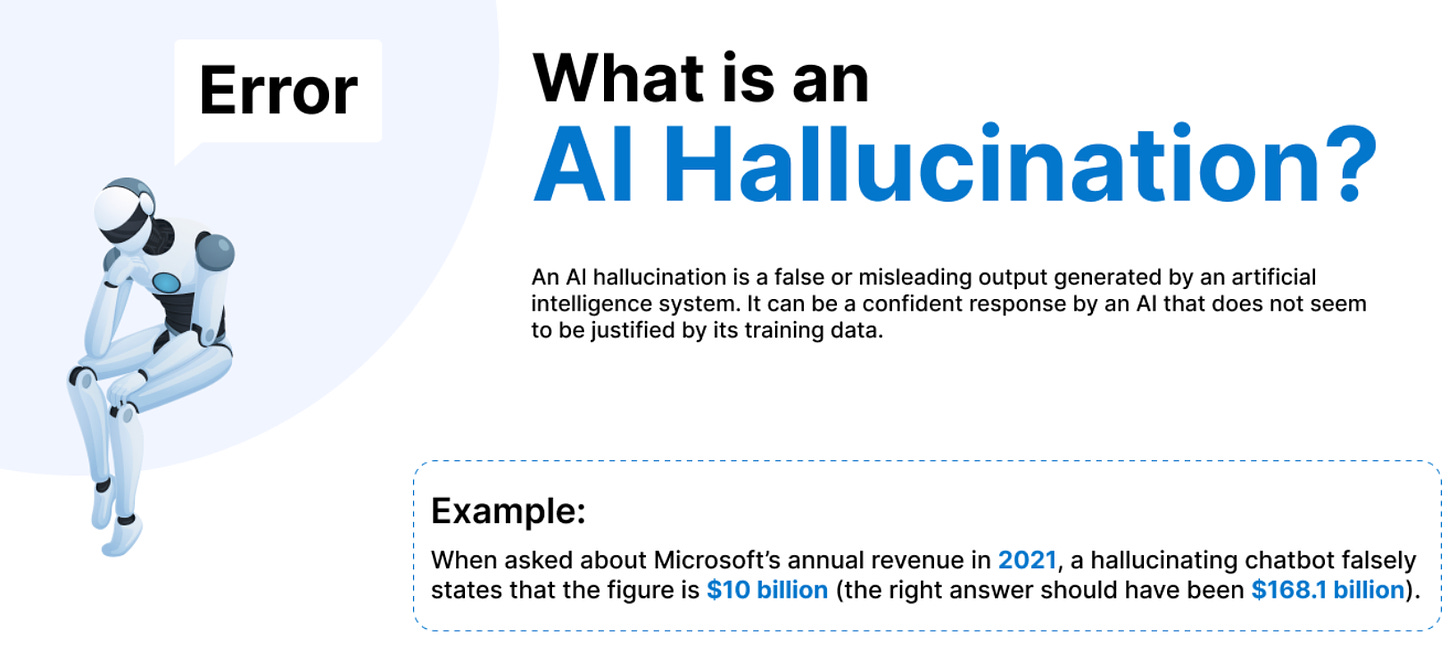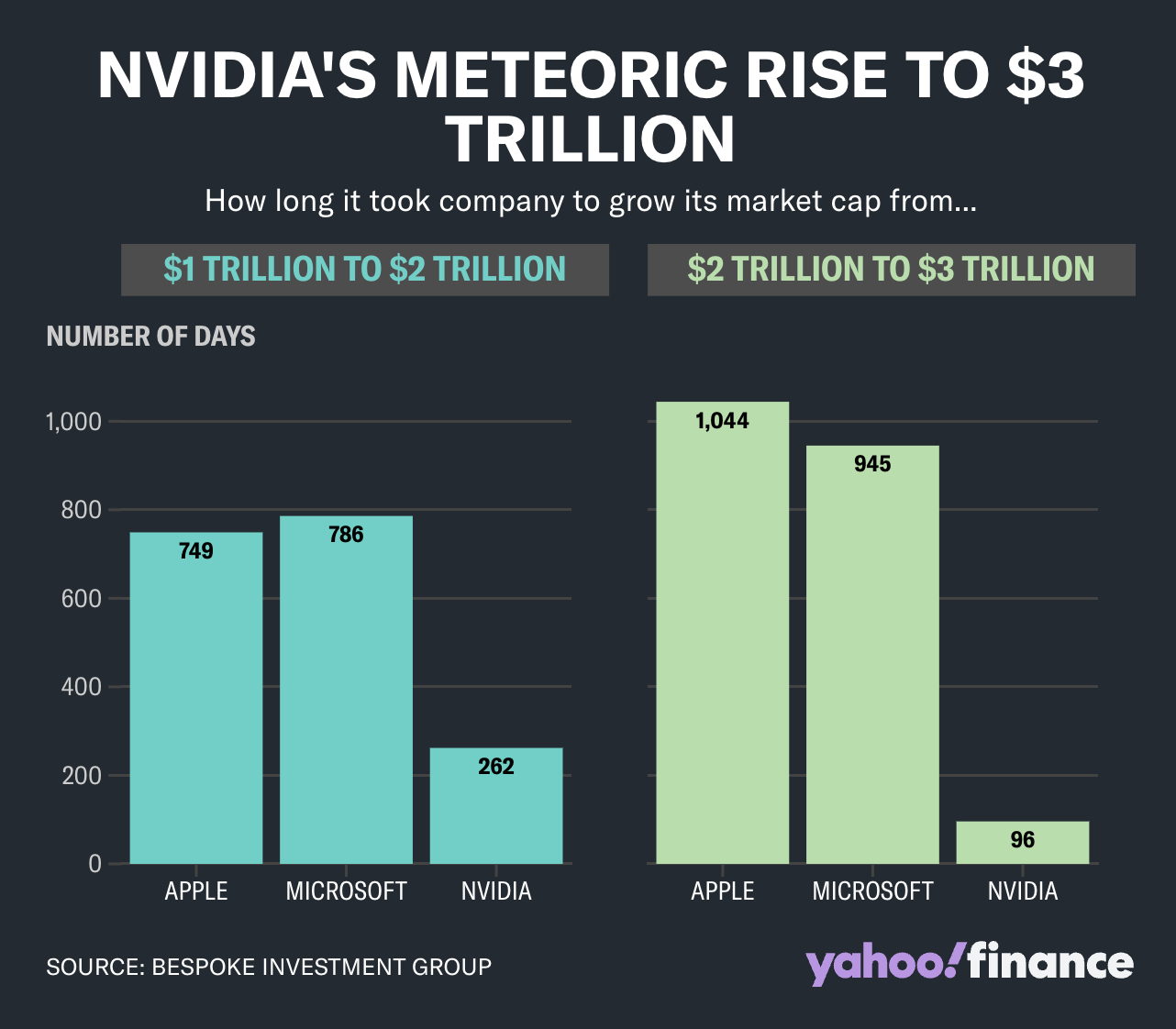- Yaro on AI and Tech Trends
- Posts
- 💭 Understanding AI Hallucinations and How to Mitigate Them.
💭 Understanding AI Hallucinations and How to Mitigate Them.
Plus: Nvidia Tops Market Value Charts, Yet CEO Eyes Risks in Tech Shift.
Get in Front of 50k Tech Leaders: Grow With Us
Hello Team,
This is our midweek Update: Today, we delve into a practical tutorial on preventing or reducing AI hallucinations. Plus, Nvidia claims the top spot as the world’s most valuable company, and we explore the perils of social media alongside a leading surgeon's efforts to raise awareness. Your feedback is invaluable to us—please keep sharing your thoughts, ideas, and suggestions. Thank you!
📰 News and Trends.
Understanding AI Hallucinations and How to Mitigate Them.
Nvidia Tops Market Value Charts, Yet CEO Eyes Risks in Tech Shift.
🧰 AI Tools of The Day (Legal Assistant)
Surgeon General Advocates Warning Labels on Social Media.
📰 AI News and Trends
TikTok is enabling creators to generate deepfakes of themselves for ads while forming the TikTok Symphony council to assess the impact of AI-generated content (TC)
Apple’s Slow Rollout of Intelligence Features Will Stretch Into 2025 (Bloomberg)
Runway’s new video-generating AI, Gen-3, may be the best in the market (TC)
AIs are coming for social networks (TheVerge)
The ‘Godfather of AI’ quit Google a year ago. Now he’s emerged out of stealth to back a startup promising to use AI for carbon capture (Fortune)
Perplexity AI searches for users in Japan, via SoftBank deal (TC)
🌐 Other Tech news
There goes your privacy - Amazon-Powered AI Cameras Used to Detect Emotions of Unwitting UK Train Passengers (Wired)
Apple halts work on Vision Pro, aims to release cheaper Vision headset next year (9to5)
Six months after the approval of Bitcoin ETFs, institutional investment is limited, with regulatory uncertainties slowing growth and highlighting the need for clearer guidelines (Semafor)
Snap previews its real-time image model that can generate AR experiences on mobiles (TC)
EV startup Fisker files for bankruptcy after suspending production (Axios)
Understanding AI Hallucinations and How to Mitigate Them.

via Techopedia.
AI hallucinations refer to the phenomenon where chatbots and other AI models generate incorrect or fictional information. This occurs because these models, including large language models like GPT, generate responses based on patterns in data rather than retrieving facts from a definitive source. They're designed to predict the next word in a sequence, making things up as they go, which can lead to inaccuracies or entirely fabricated responses.
We have come up with a set of Tools and Strategies to Reduce AI Hallucinations:
1. Chain-of-Thought Prompting: This involves asking the AI to break down its thought process step-by-step before delivering a final answer, which can help in tracking the logic behind its conclusions and identifying potential errors. Adding: “Explain your reasoning step by step” to your prompt will help with this process.
2. Explicit Instruction in Prompts: Clearly specify in your prompts that the AI should rely on known facts or explicitly state when it does not know the answer, which can discourage the model from making things up.
3. Use Explicit Instructions: Direct the AI to indicate when it's uncertain or when the information should be verified. This can prevent the model from presenting guesses as facts.
4. Be Aware that AI Will Hallucinate: Be aware about the limitations of AI, including its propensity to create plausible but incorrect information. Understanding these limitations helps critically assess AI responses.
5. Error Rate Monitoring: Keep track of the AI's performance and error rates. This helps in understanding the types of mistakes it is prone to making and adjusting strategies accordingly.
6. Regular Feedback: Provide feedback on AI outputs. Most platforms have mechanisms to report inaccuracies, helping improve model performance over time.
7. Limiting AI Autonomy in Sensitive Areas: In areas where accuracy is crucial, such as legal or healthcare information, limit the AI's autonomy and ensure human oversight.
8. Implement Checks and Balances: Where possible, cross-verify AI-generated information with reliable sources. This is particularly important for factual claims or data-driven decisions.
By employing these tools and techniques, users can better manage AI outputs and mitigate the risk of hallucinations, leading to more reliable and trustworthy AI interactions.
FREE AI & ChatGPT Masterclass to automate 50% of your workflow
More than 300 Million people use AI across the globe, but just the top 1% know the right ones for the right use-cases.
Join this free masterclass on AI tools that will teach you the 25 most useful AI tools on the internet – that too for $0 (they have 100 free seats only!)
This masterclass will teach you how to:
Build business strategies & solve problems like a pro
Write content for emails, socials & more in minutes
Build AI assistants & custom bots in minutes
Research 10x faster, do more in less time & make your life easier
You’ll wish you knew about this FREE AI masterclass sooner 😉
Nvidia Tops Market Value Charts, Yet CEO Eyes Risks in Tech Shift.

Nvidia has become the world's most valuable public company, reaching a $3.34 trillion market cap, surpassing Microsoft and Apple. This surge is driven by its 80% market share in AI chips for data centers, with recent quarterly data center revenue jumping 427% to $22.6 billion. Despite this success, CEO Jensen Huang is pivoting Nvidia towards software and cloud services to mitigate potential declines in hardware demand. This shift includes launching DGX Cloud, which rents out Nvidia-powered servers directly to customers. However, this strategy places Nvidia in direct competition with major clients like AWS and Microsoft and has sparked tensions due to slow data center expansions and Nvidia's control over server setups. This strategic pivot aims to secure Nvidia's future in the evolving tech landscape while navigating complex relationships with major industry players.
🧰 AI Tools Of The Day.
Legal Assistant
DoNotPay - The First robot lawyer.
Detangle.ai - Make sense of legal documents.
Legal Robot - Automated legal analysis.
Casetext - Assists with document review, deposition preparation, contract analysis, and timeline creation.
Spellbook - Draft contracts and review them faster.
Download over 500+ Tools free here.
Surgeon General Advocates Warning Labels on Social Media.

Dr. Vivek H. Murthy, the U.S. Surgeon General, is calling for mandatory warning labels on social media platforms to address the mental health risks for adolescents, we personally believe that adults should lower the social media consumption as well for the same reasons.
He highlights the urgency of the mental health crisis among youth, noting that adolescents who use social media for more than three hours daily have twice the risk of developing anxiety and depression. The average daily usage among youths was 4.8 hours as of summer 2023. The proposed warning labels would inform users of the potential dangers, akin to tobacco warning labels, which have proven effective in changing behavior. Murthy also emphasizes the need for broader legislative and community action to make social media safer for young users.
Newsletter Recommendation:
Growth Forum - Learn how to build a repeatable sales process creating a pipeline full of qualified deals.
Secrets of Success - Learn Mental Models for success.


Reply